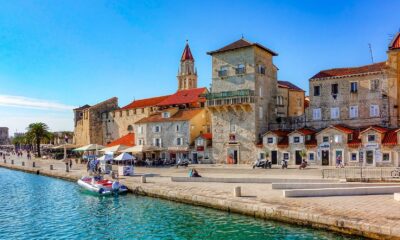Croatia is set to join the Schengen Area in January 2023. This will allow for the free movement of people between Croatia and other member states in the Schengen Area. But what does it mean for remote workers and digital nomad visa holders? Read on for more details.

Impact on Croatian Visas, Taxes & Currency
First of all, let’s quickly see what sort of impact will joining the Schengen Zone in January 2023 will have on Croatia’s citizens and everyday visitors. In particular, what does it mean for visas, taxes, and currency?
- Visa: Croatia’s membership in the Schengen Zone will allow for easier travel for Croatian citizens within the Schengen Area, as well as for visitors from other Schengen countries to enter Croatia without the need for a visa.
- Taxes: As a member of the Schengen Zone, Croatia will be subject to the same tax rules and regulations as other member states. This may result in some changes to the country’s tax laws and regulations.
- Currency: Croatia’s membership in the Schengen Zone will also make it a part of the Schengen Area’s common currency, the Euro. This will likely lead to an increase in the use of the Euro in Croatia and may impact the country’s exchange rate and its economy overall.
Impact on Digital Nomads Visa Strategies
As a remote worker, the upcoming inclusion of Croatia in the Schengen Zone could also affect your visa strategy. The Digital Nomad Visa program previously allowed you to reset your 90-day limit within the 180-day period for Schengen countries. However, when Croatia becomes part of the Schengen area, your time in Croatia will count toward your Schengen Zone stay, disrupting this strategy.
You might need to reassess your travel plans and explore non-Schengen destinations as alternative locations to temporarily reset your visa clock. This change calls for extra planning and consideration, especially if your remote work involves frequent travel within and outside the Schengen Zone.
On the upside, Croatian’s Digital Nomad Visa will now be offering remote workers greater mobility and flexibility within the European Union (EU). Once Croatia becomes part of the Schengen Zone, remote workers and digital nomads having a Schengen visa or residents from other Schengen countries will be able to enter, exit, and move freely within Croatia without the need for multiple visas or facing regular immigration checks.
This seamless movement within the Schengen Zone will make it considerably more attractive for digital nomads and remote workers to choose Croatia as their base since they can easily visit or work from other Schengen countries without additional paperwork or restrictions. Croatia’s inclusion in the Schengen Zone will simplify travel, increase opportunities for cross-border collaboration, and contribute to the overall appeal of Croatia as a remote work destination.

Want to learn more about Croatia’s Digital Nomad Visa?
Last updated June 21, 2023.
REVIEW
FAVOURITES
SHARE
NEWSLETTER
No Spam, Just Updates!
FOLLOW US
DIGITAL NOMAD VISAS


















